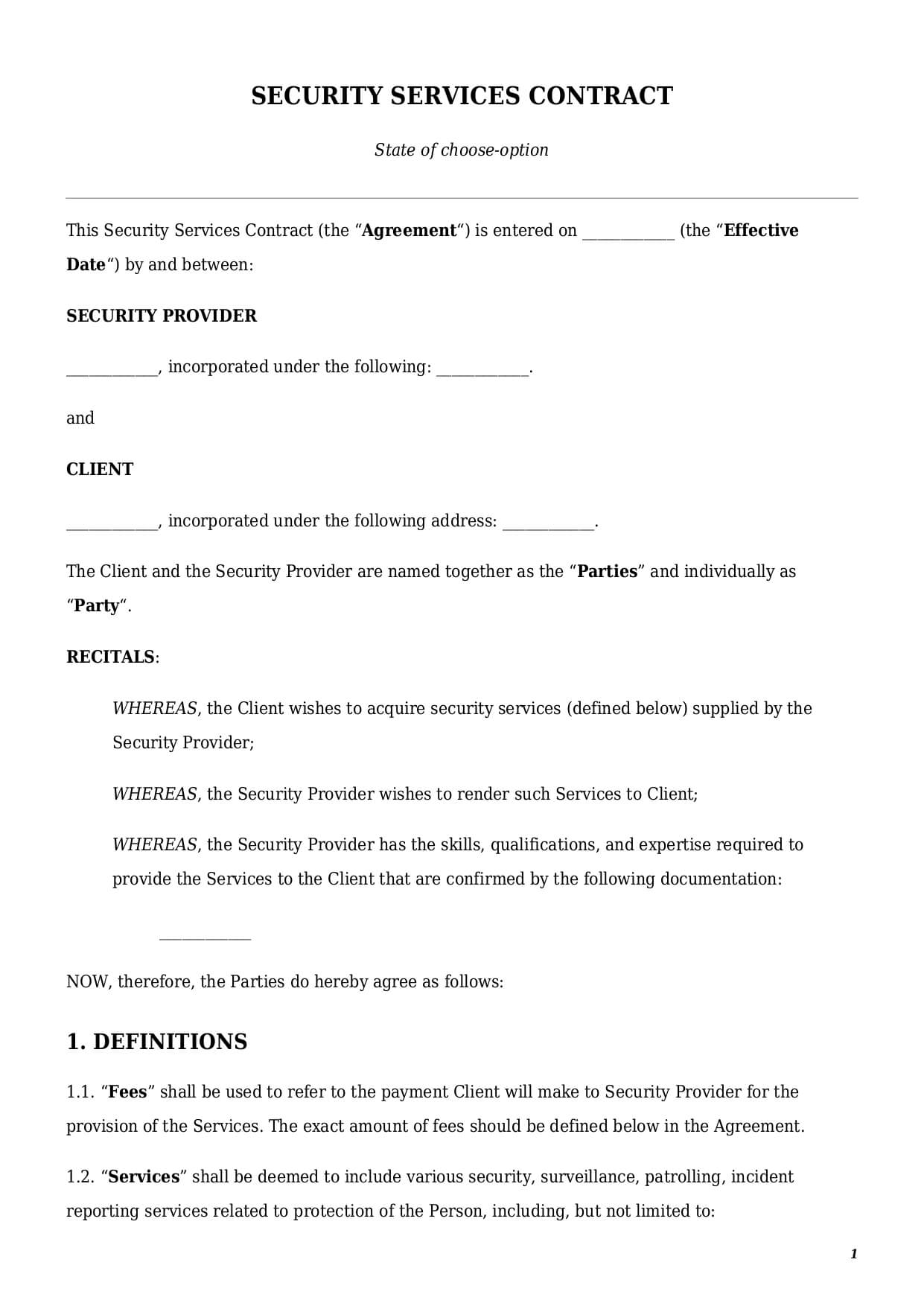Security Services Contract
Reviews


What is a security services agreement?
A security services contract is a legally binding document that outlines the terms and conditions under which a security provider delivers services to a client. The template establishes a rigid legal framework to define:
- details of the parties;
- scope of services;
- warranties and liabilities for both parties;
- payment provisions;
- confidentiality; and
- termination of a contract.
A security guard services contract is a special type of a general services agreement. Under a services agreement, one party (a service provider) delivers to a client a defined scope of services in exchange for agreed remuneration. Service agreements are not employment contracts. Therefore, a security provider is not a client’s employee but an independent contractor.
The parties involved in a security guard services contract agreement are a client and a security provider. A client could be an individual, business, or organization. It does not necessarily mean that a client should be a final recipient of personal security services. Therefore, a text of a contract should include a clause about a “protected person.” This is a person to whom exactly personal security services should be provided.
A security provider is a professional bodyguard or a security firm. All states across the United States impose licensing or other qualification requirements for security providers. Failure to meet those requirements does not allow the security provider to deliver the services.
How to draft a security services contract template?
Drafting a security services contract template could be a challenging task even for a lawyer. It is crucial to include all key elements to create a comprehensive contract from scratch. Below we prepared a short checklist of what a solid security services contract should have.
Scope of Services
This section clearly defines what services the security provider will offer. How the services should be provided to a client also matters. Therefore, even a simple security guard contract should address:
- if services should be armed or unarmed;
- if a security provider can use subcontractors;
- if a security provider shall wear a uniform while on duty, etc.
On-Duty Call Option
A solid contract template for security services may also include an option for on-duty calls. This means the client may request services outside of regular scheduled hours in response to incidents or threats. The clause should define:
- the period of time within which a security provider shall respond to such a client’s request (e.g., 30 min, 2 hours);
- the geographic location (e.g., an on-duty call might be available only within a specific city); and
- retainer fee (i.e., a sum a client has to pay for provision of such additional services).
Fee Structure
All security services contract agreements should include a clause about the fee arrangement. The payment terms should outline:
- type of fee structure (e.g., a fixed fee, hourly rate);
- acceptable payment methods (e.g., bank transfer, cash); and
- billing cycle.
Warranty Clause
Even a simple security guard contract shall include a warranty clause. This clause obliges a security provider to deliver services with due care and according to the industry standards.
At the same time, the parties should discuss a list of cases in which a security provider’s liability should be excluded or limited. Those cases may include, for instance:
- a person’s death or injury caused by unforeseeable events;
- failure to prevent accident despite efforts;
- person’s failure to follow the security provider’s recommendations.
The parties may also include other circumstances that they deem necessary.
Confidentiality Clause
Given the sensitive nature of security services, maintaining confidentiality is crucial.
The security services contract should contain a confidentiality clause prohibiting the security provider from disclosing any private information. Confidential information might be presented in:
- different types (e.g., phone numbers, locations, family members, etc.) and
- various forms (written, electronic, etc.)
A security provider shall maintain confidentiality during the whole duration of a contract. Usually, the duration of a confidentiality clause is not limited in time. Therefore, it should last even after the contract ends until the given information becomes publicly available by a security provider’s no-fault.
If the parties to a security services contract wish to do so, they can even sign a separate non-disclosure agreement (NDA). NDAs are widely used to give the utmost level of protection to sensitive information.
Termination Clause
A comprehensive security services contract template must include a clear termination clause. This clause provides how and in which situations either party can end the contract.
Same as for all services agreements, a security services contract can be terminated in either way:
- Immediate termination (e.g., material breach of contract like bankruptcy of a client or failure to prolong a license by a security provider); or
- Notice period (i.e., one party shall send a prior termination notice to another party).
A notice period varies depending on the type of services contract. Usually a security guard services contract has a very short notice period considering the personal nature of the services provided. Therefore, a notice period could last from 3 to 14 days.
Even if the contract ends, it does not mean that parties are free from any obligations that arise from that contract before its termination. For instance, a security provider ends the contract because a client fails to pay the agreed fees. Once the contract ends, a client shall remain liable for paying all the unpaid fees in full.
How to customize a security services contract at Faster Draft?
In order to personalize your services contract, follow a few easy steps below:
- Click the button “Create Document.”
- Answer simple questions in the questionnaire.
- Select a document’s format—security services contract PDF or Word.
- Make a payment.
- Download, print, and digitally e-sign a contract in seconds.
Table of content
Frequently Asked Questions (FAQ)
-
1. How to sign a security services contract?
A security services contract should be signed by both parties—a client and a security provider. Failure to put a signature by either party results in a contract not being enforceable in a court in case of a dispute.
Both parties are required to put their signature either by hand or using online e-signature tools. Both ways of signing are legally valid and acceptable.
-
2. Are security guard services contracts allowed in the United States?
Neither federal nor state laws impose restrictions related to the provision of personal security services.
At the same time, not all individuals or companies have an immediate right to provide such an activity. Legislation of all states establishes additional requirements a security provider has to meet in order to be able to engage in this type of business. Those requirements may include licensing, qualification, etc.

Looking for something Different?
Start typing to find out our collection of legal documents and contract templates
